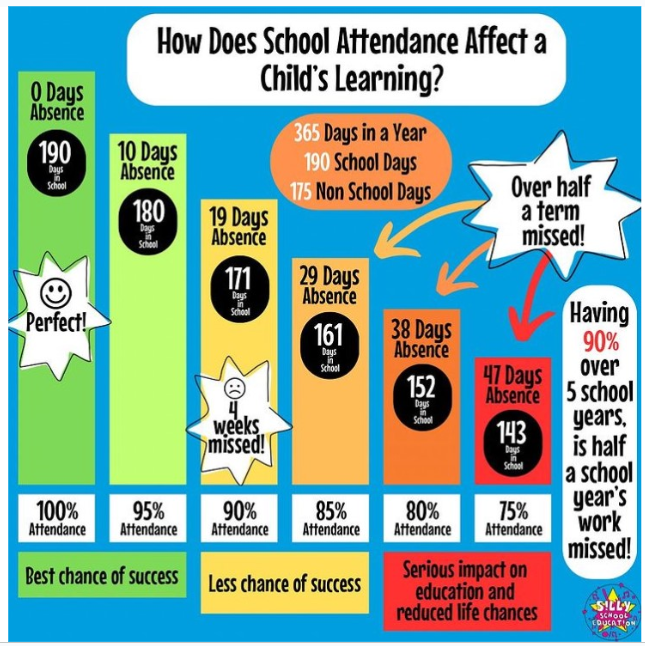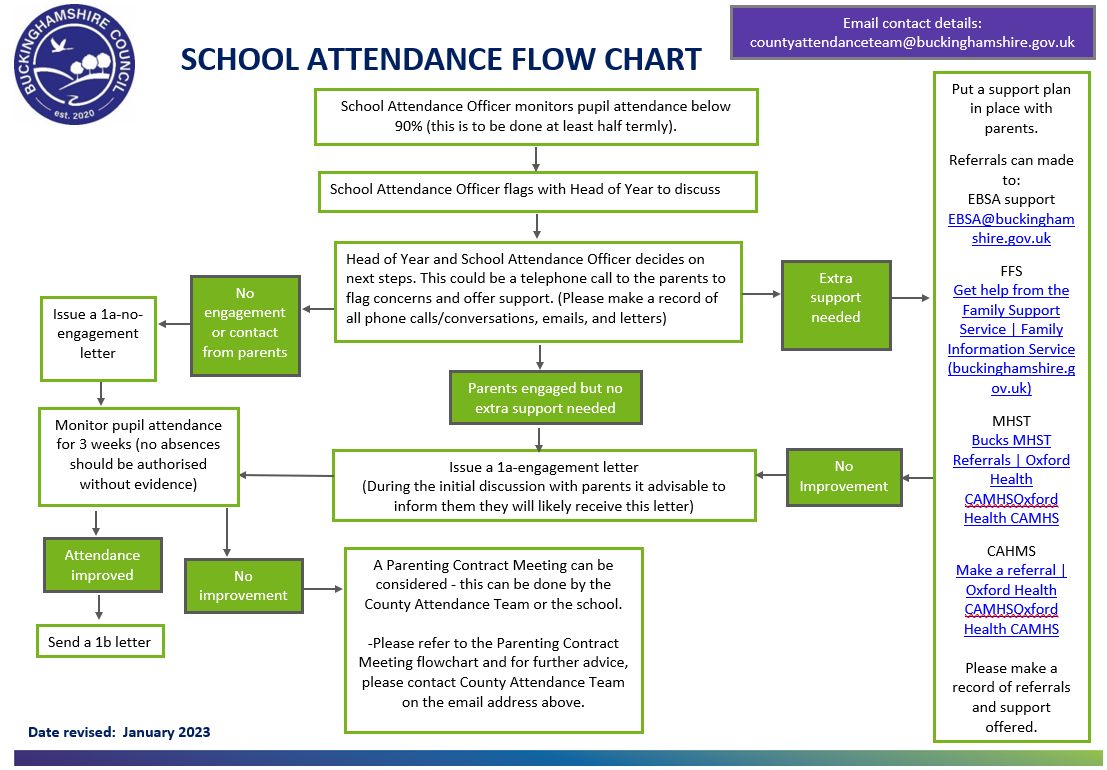Attendance

There is a clear and proven link between levels of attendance at school and academic achievement. All pupils are expected to attend every day, unless they are too unwell to do so. The NHS has a Healthier Together App (Click here), which supports parents with the decision in regard to illness and attendance at school. We expect pupil attendance to be above 95% unless in extenuating circumstances.
As you are aware, we constantly monitor our pupil’s attendance and work with parents to ensure that pupils receive the education and life choices they deserve. Good attendance in school is a key objective to improving attainment. If a child is absent from school they miss out on key aspects of a sequence of lessons, alongside key building blocks within a curriculum topic and other key aspects of learning.
Why is attendance so important?
Not attending school has a huge impact on your child's learning, where foundational knowledge can be missed, which leads to gaps in their knowledge later on in their education. A 90% attendance rate means a pupil is missing one half day of lessons every week. If that pupil has a 90% attendance rate through KS1 and KS2 they will have missed one half of a school year in that time!
The graphic below shows the impact attendance has on pupil achievements;

Good school attendance contributes to all outcomes for every child. Parents should perform their legal duty by ensuring their children attend regularly and are punctual to their lessons. Time away from school also has a huge impact on young children socially, as they may find it difficult to form strong relationships with their peers if they are often absent. It is also very difficult for them to catch up on missed work which continues while they are away.
Obviously, if your child has an illness that requires them to be kept at home, we ask that you adhere to the following guidelines:
- Please notify us by 8.40am of your child’s absence on the first day and tell us what the specific illness is i.e. sore throat, sickness bug – not just unwell.
- Continue to contact the school each day of absence. Work will not be set for children, as if they are well enough to work at home, they are likely to be well enough to attend school. However, in extenuating circumstances, pupils are encouraged to access online learning platforms such as Times Table Rock Stars and Spelling Shed.
- Only keep your child home for as long as the illness lasts – even if this means returning to school on a Friday – this is still a school day and is a whole day of learning that your child will miss!
- Please do not keep children at home for any other reason, e.g. sibling/parent illness, birthday, day out.
When a child is too unwell for school
This can be a difficult decision to make. With some illnesses it is very clear. However, with general coughs, colds and viruses, it can be more complicated. A good guide is that if they are struggling to stay awake or are running a temperature, they should stay at home. Otherwise, send them to school, and we will certainly contact you if they are struggling.
There is some guidance here from the NHS which clearly outlines when children should be kept off school for particular conditions: NHS Guidance
The most common illnesses that you may want information on are listed below:
- Vomiting or diarrhoea- your child must stay at home until 48 hours have passed since the last incident.
- Chicken pox- your child must stay at home until the spots have started to scab over.
- Headlice- children can be in school but should be treated as soon as possible.
- Covid- three days' absence is recommended by the NHS.
- Conjunctivitis- children can be in school but should be treated as soon as possible.
Attendance for Children with Medical Conditions or Disabilities
We understand that some children will have lower attendance rates due to medical conditions (including mental health) or disabilities that require regular treatment or medical appointments and that some of these children will also have more days when they are too unwell to attend school. We endeavour to work closely with these families to support regular attendance and get the best outcomes for the child, providing any reasonable adjustments that may be needed. In cases where parents are telling us that low attendance is related to a medical need, we will contact the GP practice for confirmation.
Monitoring Attendance
The attendance of our pupils is regularly monitored. Registers are taken at 8.45am and after lunch daily. Any children who are not able to attend that day should be reported to the office by parents before 9am.
Reporting absence-
- 01494 527113
- office@beechview.org.uk (use Absence in the subject line)
Any child who we do not have a reason for absence for, we will contact parents requesting information with regards to their reason for absence. This allows us to ensure that children are safe and parents are aware that they are not in school.
The overall attendance in the academy and the individual attendance of pupils is regularly monitored by staff:
- Mrs Parry-Woolner (Headteacher)
- Miss K Evans (Deputy Head)
- Mrs A Smith (Office Manager)
Supporting improved attendance
At school, we strive to encourage attendance through a variety of strategies, such as a well-designed curriculum, enrichment activities and various rewards. We want our pupils to want to come to Beechview! An example of this would be the '12 Days of Attendance' initiative, which we promoted prior to the Christmas holiday. For the past three years, we have seen a trend of attendance declining in the last three weeks of the term. To tackle this, we set the children a challenge of attending for 12 days in order to receive a great gift. We have been thrilled with the response!
12 Days of Attendance: Comparing same 3-week period prior to Christmas shows following progress this academic year
|
December 2023 |
December 2024 |
% improvement |
|
|
Week 1 |
89.89 |
93.07 |
+3.18 |
|
Week 2 |
88.15 |
91.64 |
+3.49 |
|
Week 3 |
84.72 |
92.65 |
+7.93 |
We will continue to run more initiatives to promote attendance at Beechview Academy and greatly appreciate all the efforts of the families who supported their children's attendance.
Parents are informed of individual attendance figures at Parents' Evenings and on their child's annual school report, and we mention attendance in our fortnightly newsletters to parents as well as weekly notices on Class Dojo.
Having good relationships with parents is very important to us and we will, in the first instance, try to work with parents where a pattern of poor attendance is emerging. This is in order to see if there are any barriers to attendance that we may be able to support with.
We work closely with Buckinghamshire Council on improving the attendance of pupils. Where a pupil has been identified as having persistent absence, we follow the Buckinghamshire guidance. The Buckinghamshire Council have updated their website to assist families further with improving attendance. Follow the link to their website.
Please see the flowchart below for school attendance.

As you can see from the flow chart, the process involves:
- Notification letters
- Parent meetings
- Parent contracts
- Offers of additional support.
Where all other voluntary support has not resulted in improved attendance, legal intervention may be necessary to enforce it.
We would ask for your ongoing co-operation and if you have any concerns please do not hesitate to contact the school for support.

